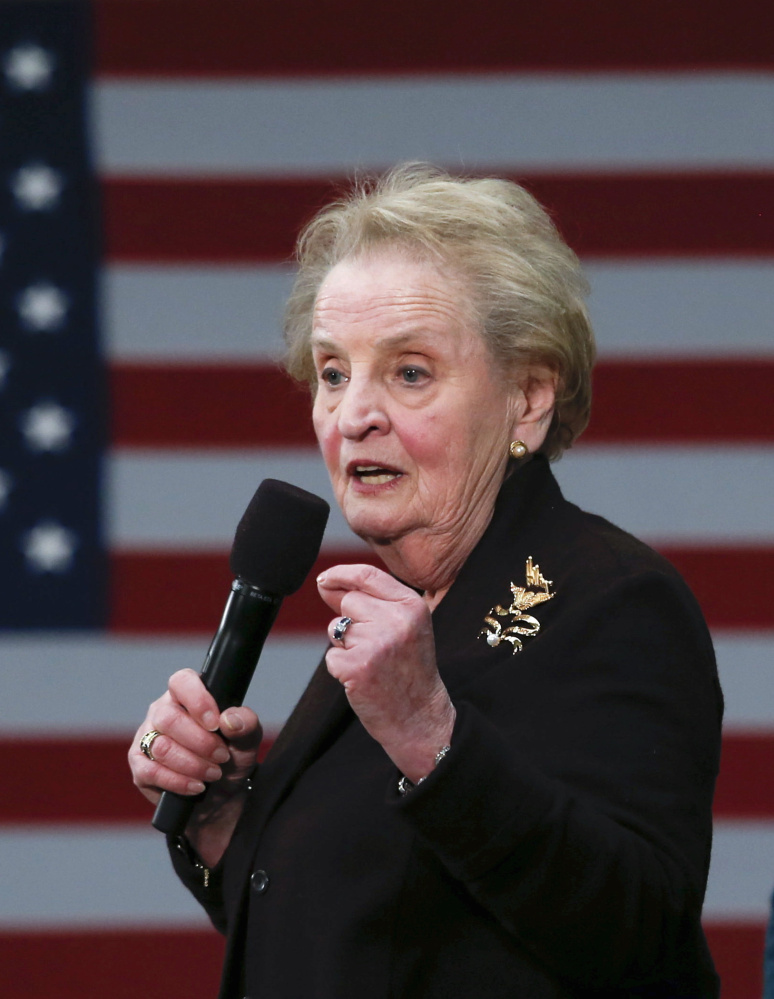KENNEBUNK — Madeleine Albright’s insertion of gender into politics at her New Hampshire primary appearance on behalf of Hillary Clinton caused an angry backlash. But, politics aside, a valuable discussion has been cut short.
Albright’s controversial statement, “There’s a special place in hell for women who don’t support other women,” has context.
She uttered these words years ago in defense of other women in the foreign service. She has used them since to explain her presence, to explain why she shows up and because she believes the adage is an important reminder to all that the struggle for justice is still being fought.
The most famous event, at least until now, where she voiced her “saying” (as she calls it) was a Celebrating Inspiration luncheon honoring the WNBA’s first all-decade team in 2006.
There, Albright shared stories of her interaction with the world’s most downtrodden, and of their hope and perseverance. She spoke of a 3-year-old girl who lost an arm to a soldier’s machete, about women being trafficked as a commodity, about 600,000 women a year who die of pregnancy-related illness or childbirth.
She spoke of men and women being decimated by AIDS, and the inspirational work of those who struggle against disease with truth-telling campaigns and the distribution of contraceptives. She spoke of making a difference, and that the empowerment and respect of women will contribute to reducing global despair. She concluded with her now-famous saying.
That speech sounds a little heavy for young women who in just a few hours were about to play a big all-star game, but the session was extended while they peppered the feisty ex-diplomat with questions about diplomacy in a man’s world, Korea, Iraq, gender income disparity, personal heroes and Title IX. These young women were not offended.
Albright’s life story is relevant. In the late 1950s, when most women who went to school did so to find a husband, Albright went on scholarship to all-female Wellesley College.
She would become U.S. ambassador to the United Nations. She served as the first woman U.S. secretary of state. She had reached the highest position ever attained by a woman in American history. Short in stature, she was, and is, a giant pioneer in a man’s world: that of global power and diplomacy.
“Special place in hell”? Although Albright was speaking to a friendly audience who laughed with her, the media and television audience didn’t appreciate the guilt trip. The quote is blunt and surprisingly undiplomatic. But I think I understand.
I remember scratching my head during the Barack Obama-John McCain presidential campaign when an African-American on TV was undecided. I certainly understand that a citizen’s vote is intensely, and rightfully, personal and need be justified only to oneself.
But I was thinking: In that man’s shoes, given this country’s long, tragic crisis in race relations, wouldn’t I feel the pride of the symbolic recognition of equality and respect that the election of a black president would mean? I know later, in November 2008, I was proud that America had evolved and sent an important message to the world.
No, voting should not be solely based on religion, race or gender. I’m a feminist, but you won’t catch me voting for a certain lady from Alaska to be president just because she is a woman.
But, surely, the election of a female U.S. president and leader of the free world will not only be a precedent for men and women, but also a role model for boys and girls. I believe my grandsons and granddaughters will see a woman president, and that will have great significance, whether it’s next January or in another generation.
Madeleine Albright, too, sees the big picture. Yes, Clinton has been there for her before, and now she stands with Clinton. Thus the quote.
But Albright deserves credit for her own struggle, perseverance and accomplishments, all in a man’s world. Now, as a professor, she expresses herself freely, which explains why she smiles at the foreign media’s characterization of her as “elderly but dangerous.” And in her frankness, she tells us that ending gender inequality requires more of us to step up.
Edmund Burke explained that for tyranny to win, it is necessary only that good men do nothing. Albright’s saying, for the past two decades, has merely changed the gender. This lifelong humanitarian does well to remind us, even through controversy, that women’s equality is a goal not yet attained.
Send questions/comments to the editors.


